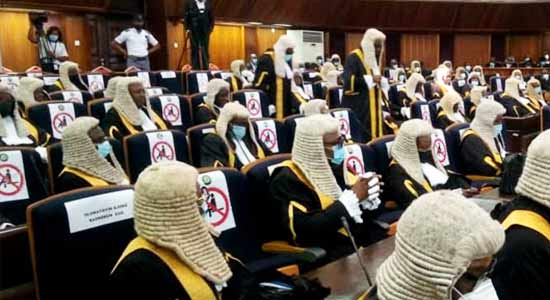Witness narrates how Ex-HoS, allies diverted public funds to private companies in court
JUSUN Strike: How Judiciary Should Handle Backlog Of Cases — Lawyers


By Joseph Ayinde
Former Nigerian Bar Association, NBA Chairman, Dr. Olisa Agbakoba, SAN, is of the view that to be able to clear the backlog of cases, procedure for making formal applications and argument should be suspended.
He said: “The heads of courts will need to have an aggressive proactive plan to clean up the backlog by applying, to the fullest effect, powers already inherent in every single judge, namely; the simple device of case management. Case management strategy empowers a judge to decide the most prompt manner of hearing and disposing cases in very short order, while applying rules of fairness and justice to all.
“Additionally, use of virtual hearings will be extremely useful to do clutter congested dockets. Formal process of arguing cases and applications ought to be suspended while documents-only proceedings will help the speed of justice attain the goal of achieving the overriding fundamental objective of efficiency in justice delivery.”
Judges would have to reconsider their annual vacation ― Pedro, SAN
Lawal Pedro, SAN, is of the view that judges would have to reconsider their annual vacation which comes up next month.
He said: “That should not pose much problem to the heads of courts since no new suits were filed during the strike. As expected, the heads of courts have already granted exception for payment of penalty for late filing of process caused by the strike. Going forward, each judge will have to superintend his/her Registrar in the management of the files in his/her court for new dates for pending cases.
“My concern now is after two months strike, what will happen in a month’s time when courts are expected to be on annual vacation for 2021 (July- September)? This is an issue the head of courts will have to contend with having regard to the judges’ right to vacation in a year.”
Rules of Court should be strictly applied ― Adegborioye
Adenrele Adegborioye posited that strict adherence to the rules of court would help clear the backlog of cases. Also advocating for judges to forfeit this year’s annual vacation, he said: ‘There are no two ways about it, they should just strictly apply the rules of court and follow the provisions in the rule diligently.
This is because the current rules of court have made provisions for speedy dispensation of justice. The problem of delay that often occurs in the dispensation of justice is mainly due to the inability of the judges to understand and apply the provisions of the rules.
“Furthermore, since the judges have just enjoyed over two months break, I will enjoin the Chief Justice to scrap the coming long vacation in order to give the judges enough time to attend to the backlog of cases arising from the strike.”
Late court sitting should be curbed ― Akingbolu
To help mitigate the situation, Kabir Akingbolu opined that judges must commence daily sittings by exactly 9:00am to be able to entertain many cases.
According to him: “There is no gainsaying the fact that more than half of last year was a waste as a result of the negative effects of COVID-19 and up to about three months ago that the strike occurred, the courts have not been sitting optimally. Now that the resumption has been announced, one would expect the heads of courts to take effective and adequate steps to ensure that cases are handled with dispatch. It is also expected that the heads of courts should reduce drastically the length of annual vacation for judges.
“Although, annual vacation is statutory, going on full length vacation by judges after all these interruptions in the judiciary, will be calamitous. The heads of courts should also roll out effective Practice Directions to curb late sitting by judges and stress the need for quick dispensation of justice, anything short of these will affect effective performance of the judiciary.”
Practice direction should be enhanced ― Ugwummadu
Immediate past National President of Centre for the Defence of Human Rights, CDHR, Malachy Ugwummadu noted that an efficient practise direction which must be enforced, would help clear the backlog of cases.
According to Ugwummadu: “The respective heads of courts should develop a template that captures all cases that came up within the period of the strike and quickly direct judges of courts to meet with their respective registrars and prioritise the cases according to their importance and urgencies particularly on bail applications and fundamental rights issues. They should also quickly develop and strengthen Practice Directions that will fast track all proceedings and take care of unnecessary technicalities.”
There should be a waiver for extension of time applications ― Awe
Babatunde Awe believes that the National Industrial Court has set an example that other courts should follow by expanding the scope of the directions they are issuing on waiver of practice fees to also waive the need to file applications for extension of time.
He said: “My humble advice is for heads of courts to emphasize the need for an effective and efficient case and time management by individual judges. Many judges have already mastered this skill and they are performing exceptionally and dispensing justice with grace, efficiency and speed. I have particularly noticed that many heads of courts have issued practice directions waiving the payment of penalties for default in taking steps.
“This is very commendable. However, there appears to be some ambiguity in the directions. I think heads of courts should borrow a leaf from the President of the National Industrial Court and expand the scope of the directions they are issuing on waiver of practice fees to also waive the need to file applications for extension of time.
“This will help ease the burden on judges being inundated with unnecessary applications of that nature affected by the strike period, and help move things along faster. The registries will also suffer less congestion and less downtime from the sheer volume of such applications filed.”
Editors Note; Originally published in Vanguard








